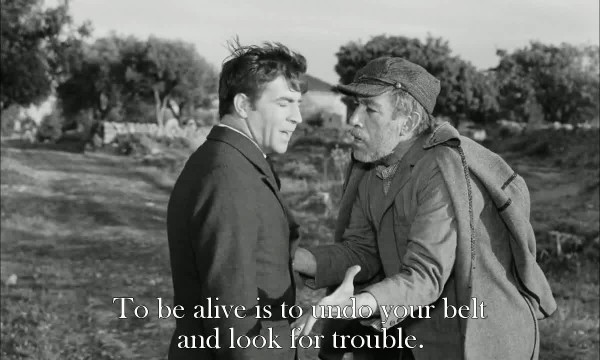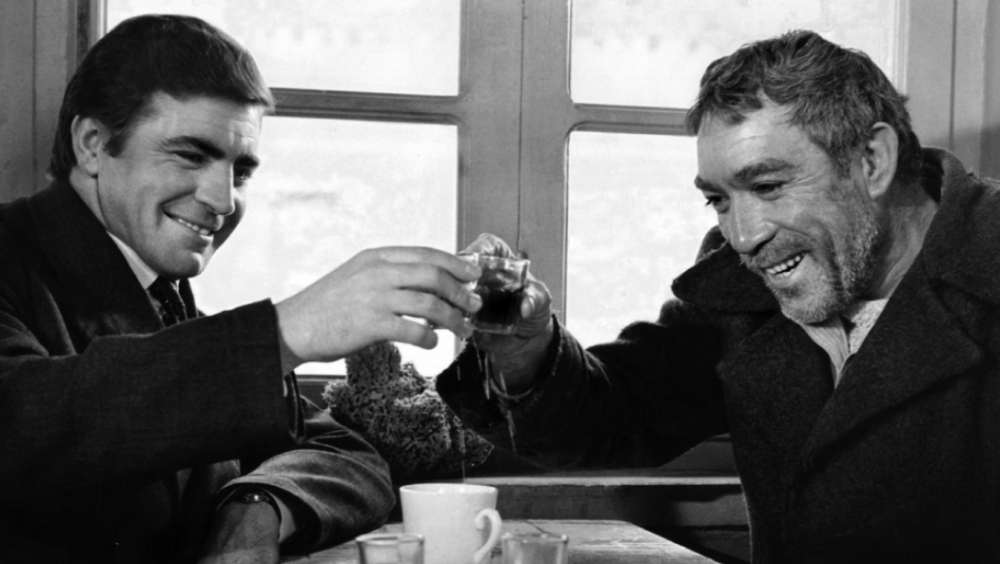Article recovered from archives of my old blog originally written on the 11th of June 2019. This article captures what the old me called a ‘journal entry’ and it is a fascinating time capsule of who I was at the time and what I was grappling with in my mind.
Over the last month, I have had several requests from my mentor to watch the film of the book, Zorba the Greek, originally written by Nikos Kazantzakis on January 1, 1946. This evening, I watched the film from start to finish, which if you know me is impressive due to the fact it is 142 minutes long.
What is Zorba the Greek?
IMDB:
An aimless English writer finds he has a small inheritance on a Greek island. His joyless existence is disturbed when he meets Zorba, a middle aged Greek with a real lust for life. As he discovers the earthy pleasures of Greece, the Englishman finds his view on life changing.
What did I think of Zorba?
For me, a Gen Z of whom the oldest film I’ve watched was likely Star Wars, it was always going to be an experience watching a black and white drama set in Greece. I paid close attention to every second of this film, unlike I do with most, due to the importance my mentor had mentioned it would bring. It was suggested as a necessary watch for me due to the beauty that is found within the main character’s existential challenges and thoughts; which is reflective of my current situation.
The movie is a beautiful piece of art which encapsulates Greek culture, dance as an expression of emotion and energy, the challenge of existential thoughts and depression and the general question of ‘how can I be happy?’
I felt once more how simple and frugal a thing is happiness: a glass of wine, a roast chestnut, a wretched little brazier, the sound of the sea. Nothing else.
– Zorba the Greek, Nikos Kazantzakis.
Zorba the Greek is a film about life. How does one live it? How does one deal with the vicissitudes, challenges and struggles of it. Does one simply stand to the side, watching it from afar, or does one jump into the unknown and do their best to ‘live’?
Look, one day I had gone to a little village. An old grandfather of ninety was busy planting an almond tree. ‘What, grandfather!’ I exclaimed. ‘Planting an almond tree?’ And he, bent as he was, turned around and said: ‘My son, I carry on as if I should never die.’ I replied: ‘And I carry on as if I was going to die any minute.’
Which of us was right, boss?”
– Nikos Kazantzakis, Zorba the Greek
The character of Zorba is the voice in our head that reassures us, advises us of the good and gives us hope and optimism. Not in a comforting way, but a happily challenging way.
And, when everything you’ve ever wanted or worked towards comes crashing down at your feet (as it does for Basil, in the film), what do you do, then? Dance. Dance as hard and as wild as you can. The film ends with Basil asking Zorba to teach him how to dance after their mining venture literally collapses at their feet. With a look of surprise, the spirited Zorba responds with the words: “Dance? Did you say, ‘Dance’?!” And the story famously ends with both men dancing enthusiastically on the beach.
When everything goes wrong, what a joy to test your soul and see if it has endurance and courage! An invisible and all-powerful enemy—some call him God, others the Devil, seem to rush upon us to destroy us; but we are not destroyed.
Zorba the Greek, Nikos Kazantzakis.
Zorba the Greek is a piece of art that reminds us all of the beauty in just “being” and “doing”.
This film encapsulates (perhaps unknowingly) a stoic philosophy. It displays a trip back in time, when the material western world had no hold on our minds. When things were simple. If a beautiful woman wants you, you go to her. When it was an insult to life and the gods not to.
For I realize today that it is a mortal sin to violate the great laws of nature. We should not hurry, we should not be impatient, but we should confidently obey the eternal rhythm.
– Zorba the Greek, Nikos Kazantzakis.
Will Zorba the Greek change my life?

Yes, I genuinely believe that it will. I hope that when my mine comes crashing down in front of me, I have the courage to dance.
I am learning that life is beautiful and a piece of art, and to do anything other than live it is a sin.
Life is trouble. Only death is not. To be alive is to undo your belt and look for trouble.
– Zorba the Greek, Nikos Kazantzakis.
I am learning that work is beautiful and a piece of art, and to do anything other than what you love is a sin.
This is true happiness: to have no ambition and to work like a horse as if you had every ambition. To live far from men, not to need them and yet to love them. To have the stars above, the land to your left and the sea to your right and to realise of a sudden that in your heart, life has accomplished its final miracle: it has become a fairy tale.
– Zorba the Greek, Nikos Kazantzakis.
I am learning that it is okay to feel different, crazy and mad. It is okay to be a round peg in a square hole and to do anything other than be yourself is a sin.
You have everything but one thing: madness. A man needs a little madness or else – he never dares cut the rope and be free.
Zorba the Greek, Nikos Kazantzakis.
I am learning that happiness stems from a place of balance and equanimity. That the candle shouldn’t be burnt from both ends. That it is okay to sprint, but it is crucial to stop, breathe and reflect. To do anything other than this is a sin.
All those who actually live the mysteries of life haven’t the time to write, and all those who have the time don’t live them! D’you see?
– Zorba the Greek, Nikos Kazantzakis.
I am learning to not spend my energy thinking about why other people are a certain way and do or think certain things. I’m learning that I can only make a difference by questioning myself, and to do anything other than this is a sin.
Let people be, boss; don’t open their eyes. And supposing you did, what’d they see? Their misery! Leave their eyes closed, boss, and let them go on dreaming!
– Zorba the Greek, Nikos Kazantzakis.
Above everything, I am learning to be happy. Also, that sinning isn’t that much of a problem. Just live!
